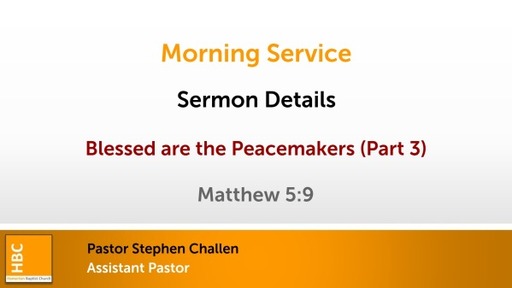Blessed are the peacemakers (Part 3)

Morning 29 October 23
Order of Service
Welcome
Hymn - AMAZING LOVE (MP 476)
Psalm Reading
Prayer
Teen Talk
Hymn - WHAT KIND OF LOVE IS THIS (449)
Notices
Main Prayer
Birthdays
Prayer Items
Hymn - His Mercy is more (1263)
Sermon Search
Reading
Sermon
The Permanent Priority
William Hendriksen says of this aspect of peacemaking, ‘Is not the church the very cork on which the world remains afloat?’
American preacher Paul Billheimer is even more direct: ‘If it were not for the church, Satan would already have turned this world into hell.’
The unquantifiable but unqualified certainty is that prayer is a powerful weapon in the hands of God’s peacemakers.
Evasive Action
A W Pink writes, ‘It is part of Christian duty to see to it that we so conduct ourselves as to give no just cause of complaint against us.’
In Guy Appéré’s assessment, ‘Peace is to the soul what health is to the body, a sign of balance and order.’
In C S Lewis’ words, ‘When passion enters a situation, human reasoning (unassisted by grace) has as much chance of its retaining its hold on truth as a snowflake in the mouth of a blast furnace.’ In striking contrast to those who have a reputation for resentment, peacemakers are those who, as someone has beautifully put it, ‘carry about with them an atmosphere in which quarrels die a natural death’.
J I Packer goes so far as to say, ‘The Bible could be called the book of God’s wrath.’
Charles Colson is right to say, ‘If Christ is Lord of all, Christians must recover their sense of moral outrage.’
Preaching on Ephesians 4:26, C H Spurgeon said, ‘Anger is one of the holy feet of the soul when it goes in the right direction.’
There are moments in our lives when a situation is so delicately balanced that the sound of a human voice can bring down an avalanche of disruption, misunderstanding and pain
Taking the right Steps
In the early part of the nineteenth century the British engineer Isambard Kingdom Brunel had a vision of building a massive bridge across the Avon Gorge at Clifton, on the outskirts of Bristol. His plans met with fierce opposition and it took years of patient negotiation before he was eventually given permission to go ahead. Today, Clifton Suspension Bridge stands as a superb and serviceable monument to its designer.
When the Puritan preacher Cotton Mather received a number of letters in which he was falsely accused he fastened them together and put them on a shelf with a label on which he wrote, ‘Father, forgive them.’
John Stott wisely warns: ‘In this case there will be the pain of listening, of ridding ourselves of prejudice, of striving sympathetically to understand both the opposing points of view, and of risking misunderstanding, ingratitude or failure.’